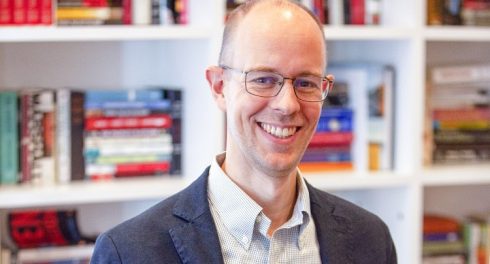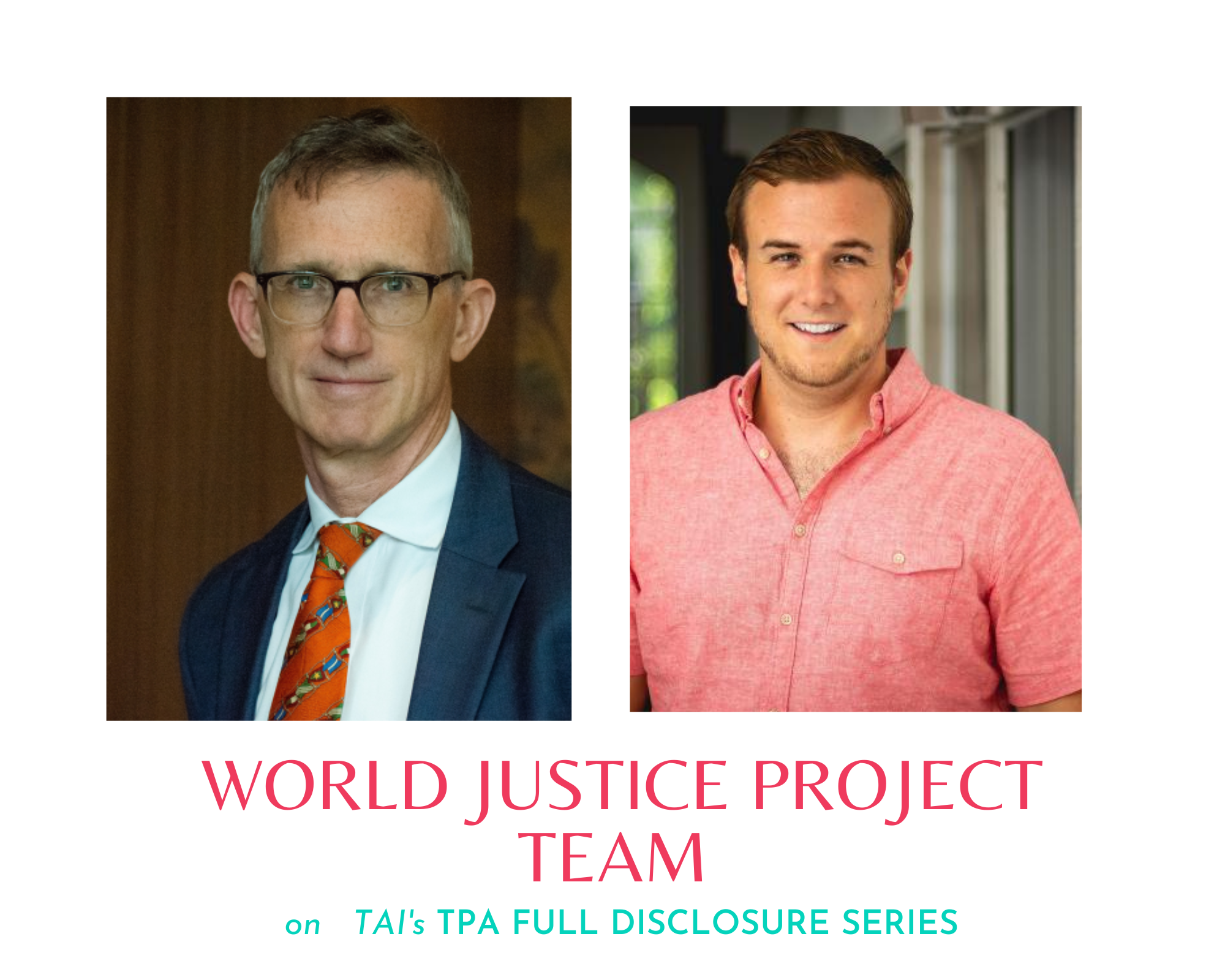
World Justice Project is the convener of the World Justice Challenge, a global competition that identifies, recognize, and support innovative rule of law changemakers at the local level and bring them together to share ideas, strategies, and tactics for reform. Two of key people working on this program are Killian Dorier, WJP’s Senior Program Associate for Engagement at WJP and Ted Piccone, an expert on global democracy and human rights policies and WJP’s Chief Engagement Officer.
We caught up with Killian and Ted and spoke on advancing and stimulating global rule of law change, opportunities and gaps in expanding access to justice and strengthening the rule of law, and the importance of collaboration among field actors on legislative reforms and the rule of law.
Please tell us more about yourself, your interests (the issues you care about), and motivation for working in the transparency, participation, and accountability (TPA) field?
Killian: I am originally from France and came to the United States almost five years ago for an internship with WJP (which thankfully, turned into a full time position!). I studied Political Science and International Relations with a special focus on international migration. Coming from France, where migration issues are at the forefront of the political discourse, I wanted to gain a deeper understanding of the dynamics of migration and examine international issues through a critical lens.
My motivation for joining WJP was to learn more about the rule of law and how it can spur progress on related domestic and international issues, such as transparency, participation and accountability. As WJP’s Founder, Bill Neukom, articulated it, rule of law is the foundation for communities of justice, opportunity, and peace—underpinning development, accountable government, and respect for fundamental rights. I was also interested in WJP’s multidisciplinary approach to strengthening the rule of law and its support for local actors.
Ted: Throughout my career, I have been interested in the complex intersection of law, politics, and foreign policy. Over time, I came to appreciate the importance of nurturing a holistic approach to our common challenges, and the critical contribution of greater openness, public participation, and fair justice to managing them. We are living through a major decline in the quality of democratic governance, rule of law, and respect for fundamental rights which, at root, requires action at the local level to reverse, nurtured by a supportive international community. I joined WJP because it sits at this junction of the local and the global. Itprovides me an opportunity to contribute toward a more sophisticated understanding of how people experience justice in their lives and the ways in which it can be improved.
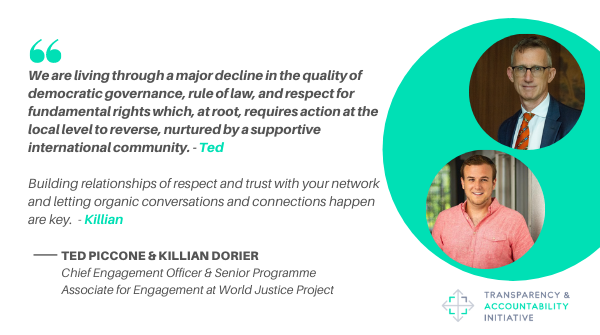 How important is collaboration to the work you do around legislative reforms and the rule of law?
How important is collaboration to the work you do around legislative reforms and the rule of law?
Ted: Collaboration is essential to our entire theory of change and work program. As a promoter and convenor of initiatives on the rule of law, our approach is centered on multidisciplinary collaboration with a specific focus on people-centered justice. We do this in two principal ways. First, our methodology for collecting data on the rule of law for our Rule of Law Index seeks to capture how justice, rights and accountable and open governance are experienced in people’s daily lives through household surveys and practitioner expert questionnaires, not by reading legal codes and regulations. This people-centered approach is a hallmark of all of WJP’s data products, which also include research focused on access to civil justice globally, criminal justice in Mexico, and rule of law in Afghanistan to name just a few. Second, we sponsor a global competition, the World Justice Challenge, to identify and support innovative rule of law changemakers at the local level and bring them together to share ideas, strategies, and tactics for reform. We are then bringing that learning to a much wider audience through direct outreach to policymakers, donors, businesses, and academia, including at our World Justice Forum.
As the Senior Program Associate for Engagement, you lead the development of WJP’s network of partners and local organizations as well as the World Justice Forum. What dos and don’ts can you share with those starting out in this field? What key moves do you wish you knew when you started working in this area?
Killian: Building relationships of respect and trust with your network and letting organic conversations and connections happen are key. We partner with a network of rule of law actors in pretty much every country around the world. Therefore, keeping in touch with them and their evolving careers and work plans requires constant attention and interaction, which can sometimes be difficult to achieve.
Keeping that web of people interconnected for mutual learning and providing a useful framework for those conversations is the essence of the job. I would say don’t force a conversation because you think it’s necessary – often, the best ideas will grow from two people whose paths you never thought would intersect. Also, be upfront about wanting to collaborate! More often than not, organizations are looking for partners and ways to interact. But everyone is busy, so putting your asks on the table from the get-go and making clear connections between your work and theirs makes it easier to build strong partnerships.
Suchhe effort is worthwhile when we are able to highlight the innovative work of an organization in our network, such as through our Resource Hub, and thereby raise their profile to an international and influential audience. While we certainly do not claim credit for the outcome of a project, we do take pride in seeing those we’ve supported achieve their goals, such as in the case of the Malawi Resentencing Project which helped drive a historic Supreme Court decision abolishing the death penalty in Malawi. Finally, by gathering these organizations we are able to put them in conversation and create synergies with people who they might not otherwise meet.
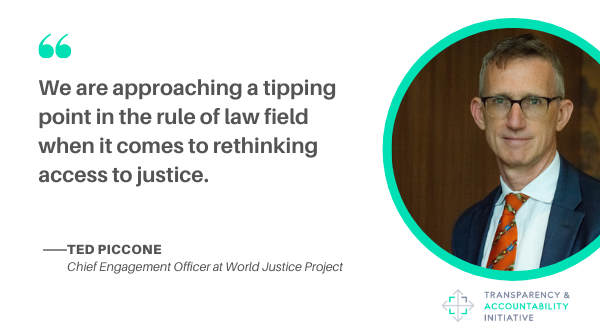 What are the current opportunities and gaps that abound in relation to access to justice? And how are you working to close these gaps?
What are the current opportunities and gaps that abound in relation to access to justice? And how are you working to close these gaps?
Ted: We are approaching a tipping point in the rule of law field when it comes to rethinking access to justice. Through a variety of efforts, access to justice is increasingly being understood as delivering justice services that respond to the needs of people, in particular marginalized groups and those who can’t access more formal, and usually more expensive and time-consuming justice services. The big gap is data: there is shockingly little disaggregated data at the local and national level that tell us how specific population groups – women, minorities, migrants, children, indigneous people, etc. – encounter the justice system, with what problems and resources, and resolve their disputes. This data is vital for decision makers to design and deliver appropriate solutions.
WJP is leading efforts to tackle this problem, first, by cataloguing how people experience justice in their daily lives through household surveys (our 2019 study covered over 100,000 households in 101 countries), and second, by developing guidelines for national statistics agencies and other data producers through the Sustainable Development Goals process (specifically Goal 16 and its access to civil justice indicator 16.3.3). Later this year, WJP will release new guidelines on how to use justice data to design and deliver people-centered justice services.
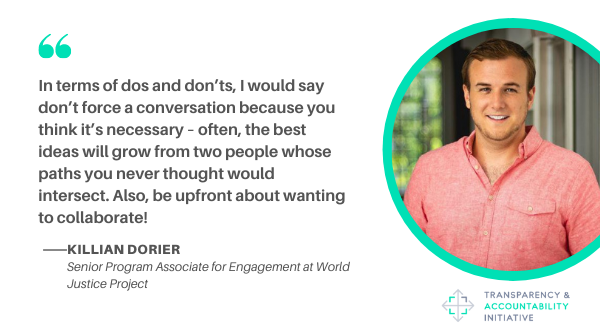 What is your proudest accomplishment since you began your tenure at WJP?
What is your proudest accomplishment since you began your tenure at WJP?
Killian: In 2019, we organized the sixth edition of our World Justice Forum and launched a new version of our World Justice Challenge. To highlight the work of these local rule of law actors, we organized an Expo space for the 30 finalists of the Challenge to share their projects, alongside other invited organizations. I led design on the space, located in the World Forum in The Hague, Netherlands, to create an open and interactive environment for each organization. The result was a lively and hands-on festival of learning and networking, with 60 organizations presenting their work, sharing experiences, and enjoying informal moments. The organizations were thrilled with the results, and it made me so proud to be able to provide such a space to showcase their important work.
Ted: The COVID-19 pandemic really set the rule of law agenda back in so many ways. In response, converting our World Justice Challenge into a virtual format focused exceeded our expectations in terms of participation and engagement with our global network. The proudest moment was to watch the joyful faces of the ultimate six winners as we announced the prizes at our live presentation in May.
If money was no object, what would you do all day?
Killian: Travel! I wish I had more time (and money!) to go and explore the world. Every time I come back from visiting some place new, I get the itch to pack my bags again. Now with the pandemic (hopefully) ending, I’m hoping that my next destination will be Vietnam!
Ted: I wish I had more time to tend to the living environment around us. With climate change and global warming underway, I appreciate even more the gifts that nature provides us and the importance of preserving them for future generations.
Love to hear more from Killian and Ted? Connect with Killian on Twitter at @dorier_killian and Ted at @piccone_ted. You can also follow-up with World Justice Project on Twitter at @The WJP


